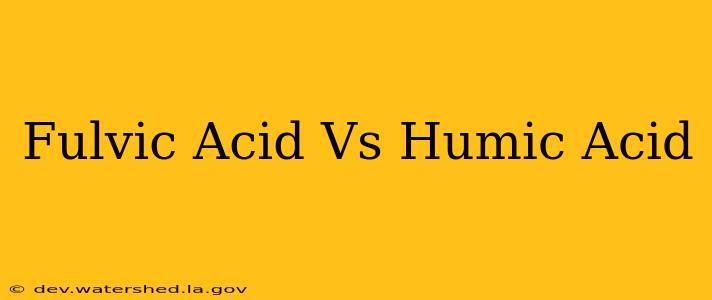Humic and fulvic acids are naturally occurring organic compounds found in soil, water, and decaying plant matter. Both are crucial components of soil health and offer potential benefits for human health, but they differ significantly in their chemical structures and functionalities. Understanding these differences is key to appreciating their unique applications. This article will explore the key distinctions between fulvic and humic acid, answering common questions and clarifying their respective roles.
What is Humic Acid?
Humic acid is a complex, high-molecular-weight organic substance formed during the decomposition of organic matter. It's characterized by its large size and dark brown or black color. Because of its larger molecular structure, humic acid is less soluble in water than fulvic acid. Its presence in soil significantly improves soil structure, water retention, and nutrient availability for plants. In soil science, humic acid is a major component of humus, the dark organic matter that gives fertile soil its rich color and texture.
What is Fulvic Acid?
Fulvic acid, in contrast to humic acid, is a smaller, lower-molecular-weight organic compound. This smaller size contributes to its higher solubility in water and allows for easier absorption by plants and even the human body. It's often described as a more "bioavailable" form of organic matter, meaning it's more readily utilized by living organisms. Fulvic acid is lighter in color than humic acid, typically ranging from light yellow to amber. It plays a vital role in chelating minerals, making them more accessible to plants and potentially improving nutrient uptake in humans.
What are the Key Differences Between Humic and Fulvic Acid?
| Feature | Humic Acid | Fulvic Acid |
|---|---|---|
| Molecular Size | Larger, high-molecular-weight | Smaller, low-molecular-weight |
| Solubility | Less soluble in water | Highly soluble in water |
| Color | Dark brown or black | Light yellow to amber |
| Bioavailability | Lower | Higher |
| Chelating Ability | Strong, but less readily available | Excellent, readily available |
| Nutrient Uptake | Improves soil structure, nutrient retention | Enhanced nutrient absorption by plants & possibly humans |
What are the Benefits of Humic Acid?
Humic acid offers numerous benefits, primarily in agriculture and soil improvement:
- Improved Soil Structure: It enhances soil aggregation, leading to better aeration and drainage.
- Increased Water Retention: Humic acid helps soil retain moisture, reducing the frequency of irrigation.
- Enhanced Nutrient Availability: It acts as a reservoir for nutrients, slowly releasing them to plants as needed.
- Stimulates Microbial Activity: Humic acid promotes the growth of beneficial soil microorganisms.
What are the Benefits of Fulvic Acid?
Fulvic acid boasts a wider range of potential applications, including agriculture and human health:
- Increased Nutrient Uptake in Plants: Its smaller size allows for easy absorption of essential minerals by plants.
- Improved Plant Growth and Yield: Increased nutrient availability translates to healthier and more productive plants.
- Potential Antioxidant Properties: Some research suggests fulvic acid possesses antioxidant properties beneficial to human health. (More research is needed to definitively confirm these benefits.)
- Potential Detoxifying Effects: It’s believed to aid in the removal of heavy metals from the body, though further research is required. (More research is needed to definitively confirm these benefits.)
Where Can I Find Humic and Fulvic Acid?
Both humic and fulvic acids are naturally occurring substances found in various sources:
- Soil: Particularly in rich, fertile topsoil.
- Compost: A byproduct of organic matter decomposition.
- Leonardite: A type of lignite coal rich in humic substances.
Are Humic and Fulvic Acids Safe?
Generally, humic and fulvic acids are considered safe when used as directed. However, it's crucial to source them from reputable suppliers to ensure purity and avoid potential contaminants. Always follow recommended usage guidelines, especially when considering internal consumption.
Is Fulvic Acid Better Than Humic Acid?
There's no single "better" acid; it depends on the application. Humic acid excels in soil amendment for improving soil structure and long-term nutrient release. Fulvic acid, with its high bioavailability, is more suitable for applications requiring rapid nutrient uptake, such as foliar feeding in plants or potential human supplementation. Both can be beneficial when used appropriately.
This information is for educational purposes only and does not constitute medical advice. Always consult with a qualified healthcare professional before using fulvic acid or any other supplement for health purposes. Further research is ongoing to fully elucidate the properties and benefits of both humic and fulvic acids.
